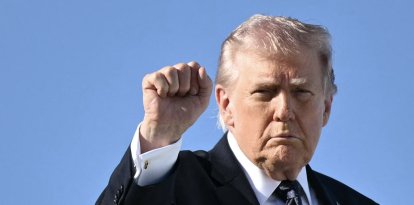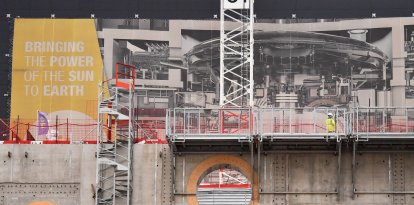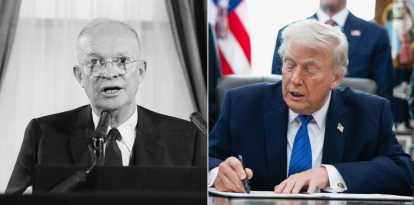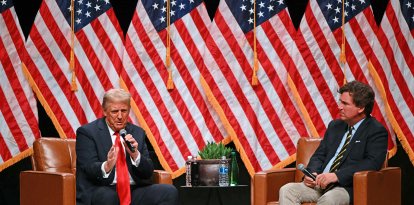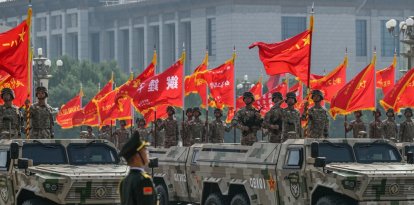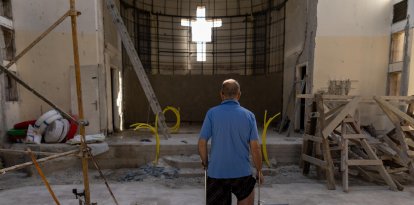Ayaan Hirsi Ali, a story of brutal honesty that led her to Christianity
First a Muslim, then one of the most prominent figures of the new atheism, today she tells how her search for truth turned her into a Christian.

(MARTIN BUREAU / AFP)
Significant life changes demand a brutal dose of honesty and humility. The openness to recognize that what we believed to be true no longer works and the humility to accept that we were wrong our entire lives. It also takes courage to take down the columns that once supported our vision of the world and prepare to rebuild while moving forward in search of truth.
The story of Ayaan Hirsi Ali, a Muslim women's rights activist who was raised Islamic, then became an atheist, and recently went from being a recognized figure of atheism to being a Christian, is a story of honesty, humility and bravery. Furthermore, because she is so intelligent and sharp on issues of vital importance, her path of religious transformation leaves very important reflections on fundamental political issues of our time.
Even for those who are not interested in religious issues, her story, in times of war in the Middle East, gives lessons that can not be ignored about the causes of the matter and about the fatal error that is being committed in international politics, like with the handling of the Islamism and Muslim migration.
Her path of conversion to Christianity, it seems to me, was in the opposite direction of most people. That makes the story even more interesting because although the development is different, the conclusion ends up being similar to many of us who have sought the path of God and have changed our minds: everything, absolutely everything, from our life and happiness to what happens in the entire world, depends on God.
Ayaan affirms that, to a large extent, her conversion to Christianity was the product of reflection on what is happening globally. She concludes that it is impossible to counteract the great problems that the West is experiencing today if we do not have the tools that come from Judeo-Christianity. Typically, people do not reflect on politics to convert, but rather, it is the need to fill the inner void that leads them to search for God, which then ends in recognizing that God is the one who changes us and that He is the only one who can change people. Therefore, a better world is impossible without God.
Ayaan's story is inspiring but, above all, essential in these times, both for non-believers who want to understand a conflict that is actually a religious war and for believers and new converts who seek the truth every day.
Honesty as the key to abandoning Islam
A fundamental part of the first change, that of no longer being Muslim, comes from a brutal act of honesty. Ayaan wondered after the 9/11 attacks — which she strongly condemned — how she could remain Muslim.
"The underlying principle that justified the attacks was religious, after all: the idea of Jihad or Holy War against the infidels. Was it possible for me, as for many members of the Muslim community, simply to distance myself from the action and its horrific results?"
That honest question and the humility to recognize that much of her life was wrong led her to fundamental conclusions. The first is that important Western leaders, intellectuals and people who influence millions refused to accept the cause of these attacks, even when Osama Bin Laden himself had made it clear: the main reason for these attacks is religious; it is the war against the infidels.
At the time, they blamed the mistakes on American foreign policy. Today, Ayaan reflects, they condemn the terrible attacks of October 7 on the policy of the Israeli government. It is a fatal diagnostic error that prevents taking appropriate measures in this regard.
The second conclusion has to do with the violent nature of Islam and the inevitable consequences of the matter. For example, regarding the war between Hamas and Israel, the activist points out several key aspects of her education in Islam, which anyone who wants to understand what is happening in Israel today should take into account. As she was taught, the greatest possible achievement is to die as a martyr in the name of Allah. Furthermore, according to the teachings of the prophet, you cannot be friends with those who refuse to convert to Islam, but you must particularly curse a group of non-converts: the Jews.
"We cursed the Jews multiple times a day and expressed horror, disgust and anger at the litany of offences he had allegedly committed. The Jew had betrayed our Prophet. He had occupied the Holy Mosque in Jerusalem. He continued to spread corruption of the heart, mind and soul."
The activist's honesty in recognizing the violent nature of Islam was one of the reasons why she decided to become an atheist.
Conversion to Christianity
On her path to Christianity, once again, politics and global events, but above all, Ayaan's extreme honesty, are key. She believes three fundamental forces are threatening Western civilization, "The resurgence of great-power authoritarianism and expansionism in the forms of the Chinese Communist Party and Vladimir Putin's Russia; the rise of global Islamism, which threatens to mobilise a vast population against the West; and the viral spread of woke ideology, which is eating into the moral fibre of the next generation." She understands that the West has tried to confront this with secular tools - military, economic, diplomatic, and technological - but has not succeeded and is losing more and more.
So, for Ayaan, the key is to find what unites us, and the response that the activist gives is the desire to defend the legacy of the Judeo-Christian tradition, understood as a set of ideas and institutions designed to safeguard human life, freedom and dignity.
"As Tom Holland has shown in his marvellous book 'Dominion,' all sorts of apparently secular freedoms — of the market, of conscience and of the press — find their roots in Christianity," says Ayaan.
Religion as a determining factor in a society
At this point, the activist reaches a vital issue in which even religious leaders and conservative politicians make mistakes: saying that the defense of life, liberty and property has nothing to do with religion is a huge mistake and ends up dragging us into the sea of defeats that we are experiencing today. Since the beginning of time, the commandments that God gave to Moses to guide the people of Israel laid the foundations for the rules that we have today as a Western society.
Many intellectuals from different fields of study have reflected on the role of religion in the success of a society. Not only because, as Ayaan highlights, the freedoms that allow the economic and scientific growth of society come from Judeo-Christianity, but also because those conservative values perfect the human being, and virtuous societies have good performances.
Love for our neighbor, even turning the other cheek when one is insulted, and the commandment not to kill are all norms that make a society great and completely different from what happens in places where Islam reigns.
So, although Ayaan had a particular path seeking Jesus Christ to answer her concern about what is happening politically in the world, she is absolutely right. On many occasions, those who comment on politics concentrate almost exclusively on secular strategies, forgetting that the origin of evil is in the soul of the human being and that the best strategy to solve many of the problems is to start from the origin and try to build societies in which love for God and your neighbor predominates, which results in the fight against sin.
It is the families, the churches, the values with which the human being grows, and the idea of God that will determine the character of the human being, and that, of course, is reflected in their political decisions, such as whether that person goes to act with resentment throughout their life, if they will envy and wish evil on the rich, or if they will join authoritarian movements that limit freedoms.
So, the activist addresses the fundamental issue instead of resorting to palliative treatments that often only attempt to contain the consequences of a human being damaged from its essence.
Beyond utilitarianism
While Ayaan begins by mentioning the world's problems as one of the main reasons for her conversion to Christianity, honesty, once again, takes her down an incredible path of revelations. She recognizes that it was a great relief to go from Islam to atheism and free herself from the burden of thinking about the possible punishments she would experience after death for not following all the teachings of the doctrine. Still, she is also clear that this fear of not reaching salvation never disappeared. And in her honesty and courage—because it is not easy to face all these doubts—she dedicated herself to seeking the truth and approaching beliefs unknown to her.
"I have also turned to Christianity because I ultimately found life without any spiritual solace unendurable — indeed very nearly self-destructive. Atheism failed to answer a simple question: what is the meaning and purpose of life?"
Ayaan's act is quite remarkable when we find ourselves in a world where most people ignore these feelings, those fundamental questions that give meaning to life. They ignore them or fill the gaps with banal distractions, momentary pleasures, and the daily grind. These days, people live in the hustle and bustle because they don't want to face those questions or dig into those voids. Young people are on TikTok and Instagram all day, always with headphones on, always avoiding silence, and without silence, there is no reflection, always making plans because they can't find peace in solitude. Ayaan is an example of the significant changes that come when someone honestly decides to face themselves and search for the meaning of life.
Ayaan's testimony and comments on his path of transformation should make many reflect, not only on the undeniable connection between religion and politics but also on the beautiful work that occurs in the life of those who are willing, with faith, to resolve the fundamental questions of existence and search for God again and again, until the soul finds peace.

















